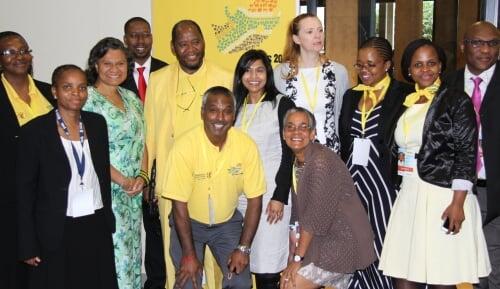Since the launch of the preliminary results of South Africa's 2011 Census in October 2012, Stats SA has rolled out a number of dissemination events, including provincial census launches. The United Nations Population Fund, UNFPA, was invited to the provincial launch in KwaZulu-Natal, one of four provinces that UNFPA has given significant support to over the past ten years.
The launch was attended by the Premier of the Province, Dr. Zweli Mkhize, who received the provincial report from the Statistician General, Pali Lehohla. A number of mayors and executive members were also in attendance, as well as various provincial ministers and dignitaries.
The official handover ceremony began with a message of support from UNFPA South Africa Representative, Dr. Julitta Onabanjo. She conveyed a message of support and congratulated Stats SA for a Census well done.
Dr. Onabanjo recognized South Africa’s dedication and contribution to the Statistical Agenda in Africa and acknowledged the release and dissemination of the Census 2011 within a year of the census count. She alluded to the positive growth and developmental achievements post 1994 in the areas of infrastructure, education and health, and said UNFPA was confident that remaining challenges of inequality would be addressed with concerted efforts and targeted interventions. She reaffirmed UNFPA’s commitment to the statistical agenda and concluded that “People have been counted – it’s time for action.”
The Statistician General provided an overview of the national census findings through a presentation on ‘Lerato’s assignment on citizens’. This was followed by a presentation on the preliminary data for KwaZulu-Natal, which highlighted the following:
- The province’s population size has increased to 10.3 million. The population grew by 7.1 per cent from 2001 (9,584,129) and is now the second largest provincial population, with 20 per cent of South Africa’s population. About 88 per cent are Black African, 7 per cent Indian, 4 per cent White and 1 per cent Coloured.
- Females comprise 53 per cent and males, 47 per cent.
- The age profile of country is changing, with 33 per cent of the population now under 15 years old.
The Premier accepted the Census data and acknowledged the population size, citing AIDS-related deaths and the outflow of people to Gauteng, Limpopo and the North West in search of employment as possible reasons for for its slowing population growth .
Dr. Mkhize suggested that KZN could be responsible for the improvement in national life expectancy, due to the notable reduction in mother-to-child transmission of HIV in the province.




